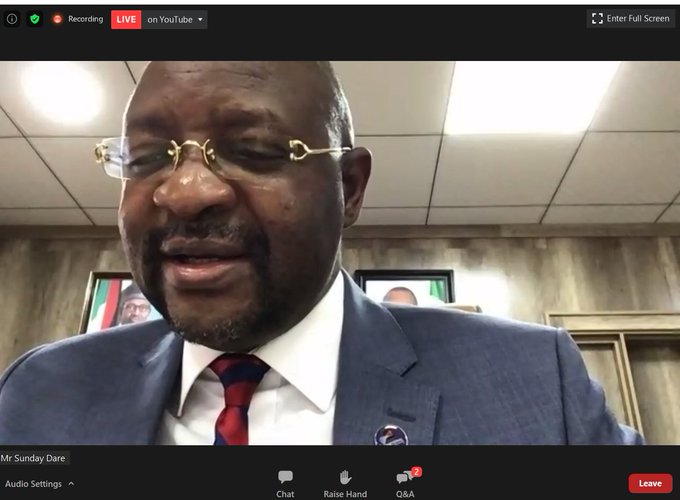” For the media to be trusted as the source of reliable information by the public, ethics of the profession must be strictly adhered to by certified journalists.”
At a webinar on “Gaining Trust for the Media in the #FakeNews Era” last Friday, an accomplished journalist and Minister of Sports and Youth Development, Mr. Sunday Dare expressed the age-long concern about journalism being an all-comers profession.
In his keynote address at the programme organized by the International Centre for Journalists Knight Fellowship in conjunction with the International Centre for Investigative Reporting, Dare noted that the present situation where just anybody can claim to be a journalist and disseminate information is part of the reasons for the spread of fake news.
According to him, there is a need for a form of certification that will ensure that only qualified persons who are well-grounded in the ethics of the profession are allowed to practise journalism.
“There is a danger when everyone is a journalist without control and respect for the ethics of the profession,” Dare stated, adding that “whether online or offline, the rules of good journalism cannot and must not change.”
The minister’s concern is very valid against the background of freedom of expression that allows anyone to own platforms for dissemination of information like journalists which have given rise to the publication of fake news.
READ ALSO: Media must effectively combat fake news- Dare
While every information disseminator is not a professional journalist, many claim to be one and have continued to give the profession a bad name.
Though some professional journalists and organizations have also been found guilty of publishing fake news, nonprofessional journalists are mainly responsible for dishing out all kinds of misinformation and disinformation.
Efforts to regulate the practice of journalism through registration or certification in the past have raised concerns about possible abuse of the process.
Scholars, journalists and other analysts often argue that licensing and certification are intrusive and pervasive ways that may be exploited to restrict the use of the media by the citizens who are guaranteed freedom of expression by the Constitution.
While the concern may be genuine, the need for a form of certification or enforcement of the existing guideline for practice of journalism in Nigeria as advocated for by the minister should be given fresh consideration by major media stakeholders.
If just anybody cannot practice other professions like Law, Medicine, Accounting and others, we join in the call that journalism should be protected from those who do not have the necessary training to appreciate the need to practice it in accordance with the highest standard.
For the media to be trusted as the source of reliable information by the public, ethics of the profession must be strictly adhered to by certified journalists.
Beyond the certification or registration, every media house as the Minister noted, should have provisions for training their staff regularly to update their skills and improve on the quality of content as training and re-training is critical.
We agree with the minister that the rules of engagement for information dissemination remain sacrosanct and have not changed. When in doubt, journalists and anyone who disseminate information should not publish.
We commend Hannah Ojo the Nigerian Knight fellow for initiating the webinar and moderating the session which has further raised awareness and called for action on the need for media professionals to be more concerned about effectively combating fake news to retain the trust of the audience.

